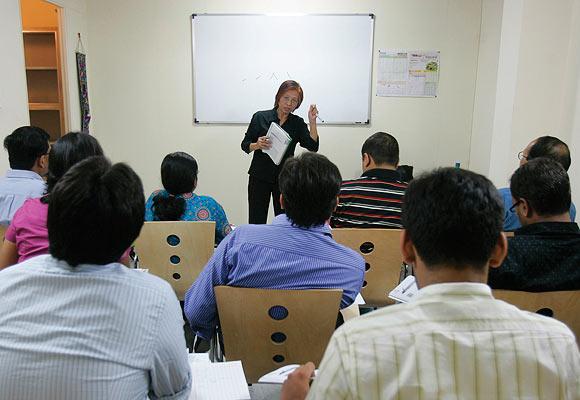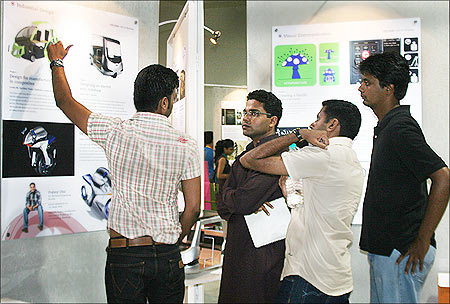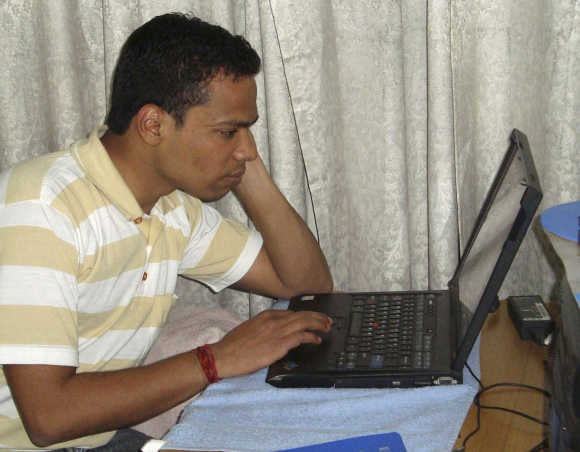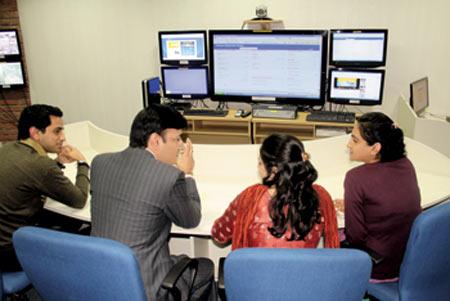 | « Back to article | Print this article |
Top tips for first-year engineering students
As soon as a student gets admitted in an engineering institute, the focus in his surroundings remains on placements. Nobody really realises that there are other things important to him as well. Listed below are some questions answered that interest students while he or she is pursuing BTech.
Is fluency in English important for an engineer?
Irrespective of the diversity of languages in India, a student must be fluent in English as a first language.
This is important for them to step into the job market, says Sarchit Batra, third year BTech student of NIT Agartala and one of the recruitment coordinators of his branch. He shares how his seniors suffered when they were rejected by companies during placement interviews because of 'inappropriate' English skills.
English is one of the six official languages of the United Nations. Often when people from different countries meet, their common medium of communication is English. It acts as a window for the engineer to gain knowledge of the developments in his field and also of the larger world.
"There are many engineers in government jobs who are doing exceptionally well with little knowledge of English. Also, there are some who are better than literature graduates. English will make your profile look more attractive," says Himanshu, a BTech student at IIT-Delhi.
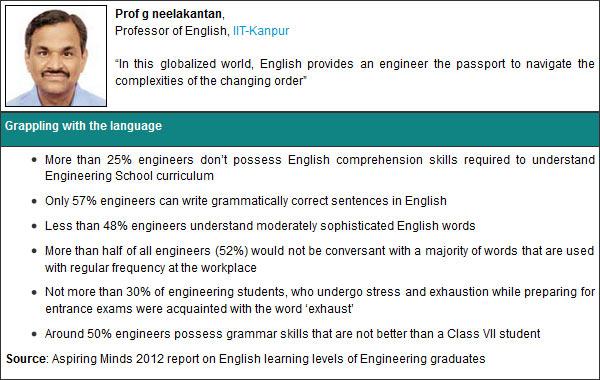
How can you build on your English language skills?
Many engineering institutes have added communication skill subjects in the curriculum. They put emphasis on presentations and seminars as part of the course.
Prateek Shah, an alumnus of Bharati Vidyapeeth, informs that his college had such a subject, and students were regularly made to give presentations and case studies to hone their interpersonal skills.
Some external faculty members and alumni were also invited to help students with group discussion and personal interview preparation.
Similarly, in K J Somaiya College of Engineering, Mumbai, there is a language lab that trains students in spoken English. Also importance of English, body language, mannerism is discussed.
If one doesn't speak well, it practically hampers one's growth prospects. Since there are many engineering colleges across the country and many prospective employers are MNCs, there is a rise in demand to improve English language skills.
Especially for vernacular medium students it is necessary to have an appropriate skill set as required for the chosen profession.
PS: In some rare cases, it has been found that students who gave their entire job interview in Hindi were selected. But such incidences are rare!
Please click NEXT to continue reading...
Enrich your experience with project work
Is project work rigorous for engineering?
"Rigorous is an understatement," says Prof Arnab Bhattacharya of Tata Institute of Fundamental Research.
He shares that at a place like the TIFR, they have engineering students who come in for short-term projects and work on real-world cutting edge research -- from ultra-sensitive antennas for the radio telescopes and front-end detector hardware for the INO (neutrino project) to fabricating nanoscale transistors with graphene using electron-beam lithography or designing better "microscopes" to track molecules inside brain cells.
"The feedback from the students has been fantastic. You suddenly get immersed into a real world research lab, which is just so totally different from the stuff that you read in a book as part of any curriculum. Finding such opportunities across the country or even around the world is also easier thanks to the information available online, and the ability to now talk to and interview candidates remotely," he says.
These projects often result in publications in top international journals with the students as lead authors.
Deepika Garg, a BTech graduate from Institute of Engineering and Technology, Alwar, says that for her project, she had to learn the assembly language.
"The experience is helping me now in my current job. Moreover, during the project I learned how to proceed for designing and apply logics," she explains.
In which semester are the projects done?
During engineering courses, projects are usually carried out in the final year. In the first half, they carry out a survey and literature review, and conclude the topic of the project by submitting it to the head of the department. In the second semester, the students do design fabrication and testing.
Some institutes have project-based evaluation for the entire semester while others have both project and exams for assessment.
How can the projects be enriched?
According to Prof Arnab Bhattacharya, Associate Professor at TIFR, through projects, the students experience a real-world research lab, which is totally different from the stuff that they read in a book, so in addition to undertaking projects as a part of their curriculum, students must also focus on doing industry sponsored research and consultancy assignments. That way, they would learn how to apply theory to practice.
What are the types of projects for engineering students?
Engineering students get an amazing choice in the type of projects they can choose to do. Depending on their specialisation in the engineering domain, the students could choose projects on telecommunication system, robotics, computer securities, control engineering, power plant analysis and economics of power transmission from generating system to the distribution, to name a few.
What if the project work is not to your liking?
There are occasions when despite your best efforts, the project work turns out to be a dud. In that case do not despise.
If you realise the status early on then immediately try to find alteratives. Do not waste your time.
If nothing works out, look for additional responsibilities within the same company.
Seek out problem areas on your own, and start working on solutions. If not anything your initiative would be valued in the future.
Develop job-relevant skills while still in college
Do engineering students get enough time to engage in extra-curricular activities?
"In engineering enough slogging takes place before you get into a college. So in college in the initial years one can participate in extra-curricular activities. Since the curricula is decided together by professors and student heads, they take care that students get enough time for such activities. For motivation part, it comes through the competition among students through inter-hostel activities," says Neeraj Agarwal, BTech (Chemical), IIT-Delhi
Do add-on courses really make a difference in employability?
India is facing a shortage of engineers with enough technical talent. According to NASSCOM, each year over three million graduates and postgraduates are added to the Indian workforce.
Of these only 25 percent of technical graduates and 10-15 percent of other graduates are considered employable. Poor quality of education, obsolete curriculum and aged infrastructure are the major reasons for the skill gap.
As a result, the students who graduate are not well equipped with required skill sets and companies incur additional cost to train these fresh graduates and newly hired employees.
"The students who are able to bridge this skill gap and offer themselves as ready to work on projects from day one surely are preferred employees for the corporates. Unlike other fields, technology is constantly evolving and to keep pace with this change students need to look outside the university curricula, which are obsolete, to get access to cutting edge technology exposure," says Aditya Malik, CEO, TalentEdge.
There are a number of such courses, popular as IT certifications, available for students. However, these certifications come for big money.
Piyush, a BTech graduate from Lingaya Institute of Management and Technology, now working with Wipro, shares that his course could not provide him the required learning to be useful in his job.
"Today companies do not want any C or C++ qualified engineers. They want Java, Dot net and Oracle-certified people. So we had to spend extra money to learn these languages," he says.
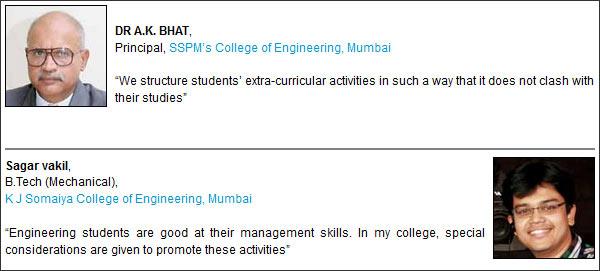
How to pick the right electives
Is choosing electives from non-engineering streams helpful?
Electives are typically more advanced courses, which a student takes, specific to a particular career s/he has in mind in the third year.
They can be a mixture of senior UG and PG-level courses.
According to common belief, it can be a good idea to choose electives from non-engineering streams. This is because a student who gets into professional world should be aware of happenings around him.
S/he should be good with core fundamentals and should know how to work with others (management).
"Students are offered electives which gives them opportunity to select the specialised subjects of his/her interest and job opportunities. They help students to evolve as professionals with specialised knowledge and skill sets," says Dr Sharad Mhaiskar, Dean, Mukesh Patel School of Technology Mgmt & Engineering, Mumbai.
What are "breadths" offered at IITs?
The IITs and some other top-level engineering institutes have a separate set of courses called "breadths" which one can take in the second year.
The idea is to take subjects outside your domain, if possible, for extra exposure.
Arvind Sowmyan, an IIT Kharagpur student, feels that if somebody is just casually interested in a subject that is irrelevant to his specialisation otherwise, it is advisable to take it as a "breadth" if available and save electives for important courses.
"I feel it is a bad idea to waste an elective on an unrelated domain. For instance, I'm from a Stats background, and I took a lot of Computer Science electives and pivoted from there to a Computer Science Master's. So take it if it's very relevant to your career of choice," he adds.
One can check for the available "breadths" and electives on the department's website.
What are minor degrees?
Another factor that comes into play is minor degrees. If a student is interested in obtaining a minor in another subject (say, an EC major wanting a minor in Mathematics), they have to collect a number of credits of math courses via "breadths" and electives. So, students have to plan for their minors from the second year by carefully selecting "breadths" and electives.
Himanshu, an IIT Delhi student who is doing a minor degree in Management with majors in Chemical Engineering, shares, "Unless you have a perfect blend of various non-engineering fields your growth curve suffers. Even companies that have engineering as core value proposition like Google, Facebook gives a lot more attention on these values so as to build their culture."
To Himanshu, arts and linguistics seems a must for an engineer because for him, arts catalyses creativity and innovation and through linguistics one can express oneself best in front of people.

Finding the right internship
How do I find an internship?
Finding an internship is a challenge for most of the students. Colleges focus more on the final year placements, so students have to look for internship on their own.
Moreover, most of the companies have pre-defined campuses. They take interns usually from the same colleges. So-called 'contacts' might come to the rescue but that too only for some. Students should follow a step-by-step procedure.
1. Start early: Don't keep waiting for the last moment to come. Spend time to achieve the best. Prepare your resume .
2. Identify your domain: Talk to your seniors, professors and friends, and understand which domain interests you and whether you really want to make a career in that.
3. Identify persons and companies: Find out alumni working in the same domain that interests you. Social media websites like LinkedIn, Facebook etc can be very useful here.
4. Start-ups: There is a start-up boom going on in India. They keep looking for interns. Find them out. Portals like Internshala help in finding them.
5. Internship fairs: There are companies that put up their live engineering or business problems in front of the students. Those students who solve them get the internship in the company. They even give cash prizes to students.
How much pay will I get during internship?
Companies have started paying stipend to the interns depending on the work. It varies from Rs. 5,000 to as high as Rs 25,000. But not many tier-2 schools students get paid internship.
"In some companies students are paid around Rs 8000 per month. But most of the companies allow students for internship/summer training. They don't pay any money," says Prof T Datta, Vice Principal, MCKV Institute of Engineering.
How to make the best out of your internship?
During internship, you'll find that there is a vast difference between what is taught in the classroom and what it actually is.
A lot of things depend on your mentors and of course, your will to study and learn. You have to make your mentors give you time.
"You can take a lot out of them by studying things, asking them questions, reading more articles and listening to their experience and advice," says Ankur Chaturvedi, B.Tech in Information Technology, BBDIT Ghaziabad who interned with Oracle Gurgaon office.
A student should try to extract as much knowledge from his mentors and colleagues. Be proactive as your employee might think that you are there for only two months so why waste time on you.
Ask for enough work and try to learn yourself so that you can add value to the company.
"When you understand how things work and you have enough work to do, try to get some timelines and work according to them. It is possible that when you are working according to timelines, you don't learn much but actually you'll learn how to work in an organisation. Try to make a report in parallel so that you are able to finish it while in the company and you do not have to go to an Internet cafe later," says Saurabh Nangia, who did his BTech in Electronics and Communication from Guru Gobind Singh Indraprastha University, Delhi.
He had interned with MTNL, Delhi and Airtel, Gurgaon. There are many institutes which allow students to undergo certificate courses as part of internship where the student has to pay a fee.
Such courses are organised jointly by the institute and companies like IBM, TATA etc.
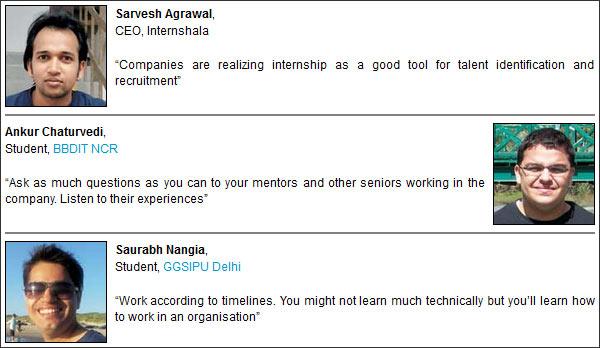
Say yes to remote internships
What is a remote internship?
Virtual internship means the intern doesn't have to be physically present at the job location and face-to-face interaction is minimal. It's like working from home.
Such internships are mainly offered in domains like Information Technology, Software development, Research, Writing, Pre and post event planning, Design, some non-profits and government internships.
Many companies now offer remote internships to students as it comes for less investment. According to online sources, Columbia University had first launched a virtual internship programme in 2009.
How does a student communicate?
Normally one doesn't have to go to office during remote internship. A remote intern has good facilities where knowledge can be easily shared and promoted between mentor/coordinator and them. They use phone calls most of the times.
Even for meetings, they work with conference calls or use Skype. And about work progress and deeds, they get regular updates through mails and chats.
Does a student get paid during internships?
Students might not be directly paid during remote internship in form of stipend or salary for that matter. Usually their expenses are reimbursed.
At some places gifts and honorarium are offered to interns. They are given goodies like t-shirts.
Apart from that, when the interns help the company like a campus ambassador in their respective institutes, they receive money as honorarium.
How do you manage studies and work during remote internship?
Hanshika Gupta, who is pursuing BTech in Pulp and Strategy at IIT Roorkee is working as a remote intern with Internshala. She is involved in promotion and marketing for the company, and also involved in core operations.
"My work is about drafting and posting details about Internship offers on the website and maintaining its database, she shares. She spends one-two hours daily in internship. She has no deadlines to meet but has to donate time on a regular basis.
Would you advise a student to go for the same?
One should definitely go for normal internships if the student feels it offers better opportunities. But, if they have interest in programming, designing etc., for which they are not getting any normal internship offers, they should go for remote internship in their field of interest.
The most important thing in internship is to gain as much experience and knowledge as one can.
Aim for a foreign internship, go places!
How to go about foreign internships during BTech?
Purnima Singhal, final year B.Tech student at NIT Agartala, has found her way to Germany for an internship in Friedrich-Alexander-Universitat Erlangen-N rnberg (FAU) this year.
She will be working on a project "Cross Compilation in Realtime System".
She shares her experience before leaving for the European country.
"As a first step to find internship in Germany, I started my search for universities and professors whose interest matches mine. I mailed to at least 500 professors in different universities. I learnt that one should stick to their field of interest while sending the mails as if different professors interact with each other and coincidently talk about you, your thoughts should not look haywire to them.
After almost a fortnight, I received replies of three professors. Now I had to get my visit funded. I applied for DAAD scholarships and thanks to my good CGPA, I won it.
Engineering students should maintain their pointers and involve in co-curricular activities since beginning if they want to go abroad.
Under the scholarship, I'll get my airfare, stipend, health insurance and help in accommodation. I will receive the fund in Germany. I'll have to work for eight hours a day while Saturday, Sunday will be off.
I have also received an invitation to the three-day Berlin meet during the period along with the documents.
I am hopeful of a good experience there for these two months. However, my institute is playing a spoilsport. They have suddenly postponed the exams by ten days due to which my two exams are falling in the internship period.
I am requesting them to let me take them before I leave, but of no help. Wish me luck!"

Develop a product, be a campus entrepreneur
What are incubators?
Incubators or Industrial Interfaces have been set up across the country in various engineering institutes, apart from other places.
These centres help not only in the growth of technology-based new enterprises but also in improving their survival rate substantially.
They are open for individuals or groups of any community and regions who can approach them directly by mail, walk-ins and phones.
Such establishments include Innovation and Entrepreneurship Development Centres (IEDC), Science and Technology Entrepreneurship Development (STED) Projects, Science and Technology Entrepreneurs Parks (STEP) and Technology Business Incubators (TBI).
As per Budget 2013, corporate funds provided to technology incubators located within government-approved academic institutes will qualify as corporate social responsibility spend.
Also, extension of the 'pass through status' to venture capital funds has been proposed.
How do incubators help students?
There are many services provided by these mentor centres like business training, technology assistance, handholding, mentoring, physical space, technical infrastructure, basic start-up funds, legal support, and importantly networking at both national and international level.
Sometimes, rent-free space for a few months is provided, depending on the case. The tenant companies have to leave the incubator space within two-three years.
In return, the incubatee pays some money either as rent fee or commission. Besides receiving capital support from the government, funds are generated by the incubators to fund start-ups.
They can be in the forms of consultancy, equity share, training programmes which make the set-up sustainable. These services are availed by incubatees in varying permutations and combinations.
Students share that visibility and guidance are the two top perks start-ups get by being at an incubation centre.

What help do they get from government?
To fund start-ups, incubators receive grants from the government in terms of technology facilities while the institutions/ co-promoters are expected to provide land and building.
The first five years' recurring expenditure is provided by the government and after this, incubators have to generate their own resources as self sustaining ventures. New Seed Funding instruments are also launched.
The NSTEDB provides up to Rs 50 lakh soft loan support for entrepreneurs while Technology Development Board provides Rs 25 lakh seed fund through the incubators concerned.
